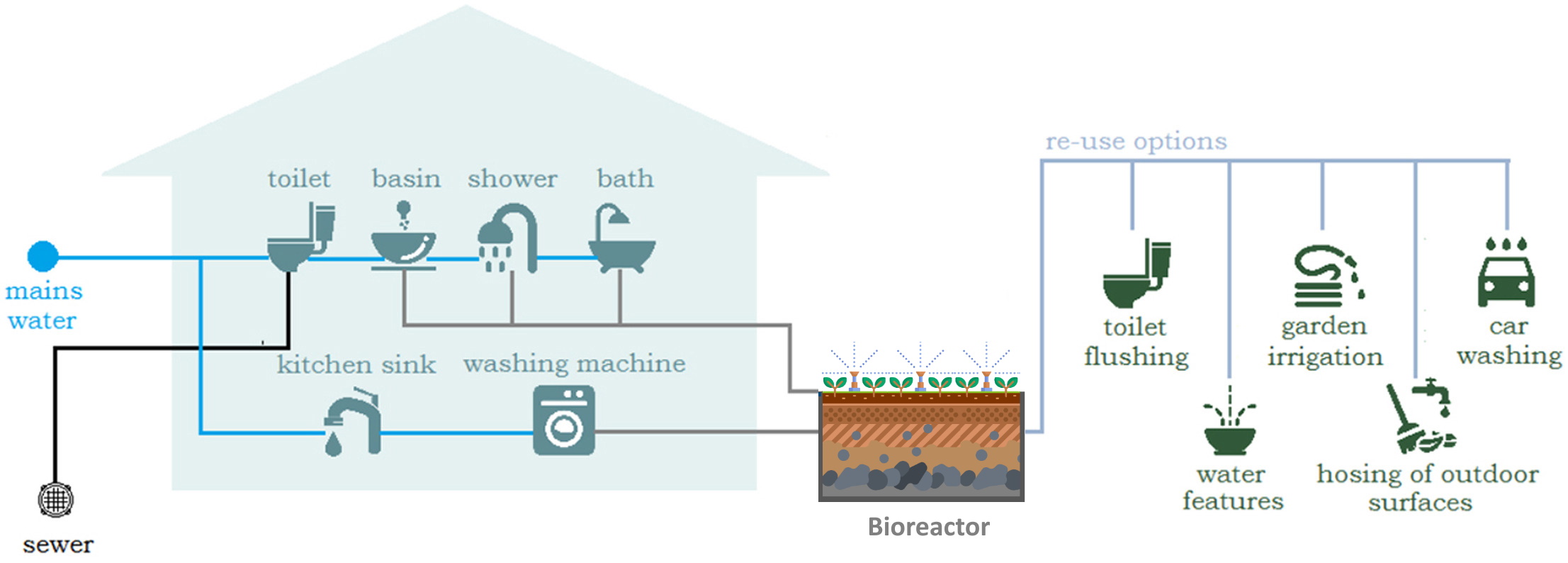
Grey water recycling
Grey Water Recycling
Grey water refers to domestic wastewater generated in households or office buildings from streams without fecal contamination, i.e., all streams except for the wastewater from toilets.
Sources of greywater include sinks, showers, baths, washing machines or dishwashers.
As greywater contains fewer pathogens than domestic wastewater, it is generally safer to handle and easier to treat and reuse onsite for toilet flushing, landscape or crop irrigation, and other non-potable uses.
The application of greywater reuse in urban water systems provides substantial benefits for both the water supply subsystem, by reducing the demand for fresh clean water, and the wastewater subsystems by reducing the amount of wastewater required to be conveyed and treated.

Greywater is nothing but SOILED fresh water. Fresh water problem & Greywater Problem are interdependent to each other. Greywater is not a liability but an asset if properly managed. Management of Greywater is not a problem but an opportunity. Grey water management is a flag ship project under Swachha Bharat Mission (SBM) phase II under Ministry of Jal Shakti Government of India. Union Jal Shakti Ministery Launches Sujlam 2.0 Campaign in 2022. Nine Ministries signed Joint Advisory To Undertake Grey Water Activities As Part Of The Campaign. Under The Campaign, Ministry plans to mobilize communities, Institutions like Panchayats, Schools, Anganwadi to undertake Greywater Management through people’s participation. Ministry ambitiously plans to mobilize over 6 lakh villages to participate for Solid & Liquid Waste Management under this campaign.
3Rs for Grey water Management:
REDUCE
Judicious use of fresh water which will result in generation of minimum quantity of Greywater.
REUSE
Using Greywater for purposes such as kitchen garden, vehicle washing, toilet flushing etc.
RECHARGE
Recharge of ground water with Greywater by adopting technologies such as soakage pit, leach pit etc.
SBT for Grey water recycling
SBT is most ideal Technological solution for Grey water management particularly for rural India. It is indigenously developed and has been in accordance with Indian geo climatic conditions as well social pattern. SBT has prior experience of working in Rural India and knows the thin line between Grey water and Sewage water with respect to Rural India in practicality.
Merits of SBT for Rural Grey water management and recycling are as follows:
- It is a decentralized type of offsite treatment.
- It has variable scale in terms of capacities – few KLD to few MLD
- It is adjustable with any contour & topography
- Its adaptability for economic structure of construction such as Rubble/Brick/Soil Embankment to save on cost and time
- Its Low capital cost in comparison
- Low energy consumption
- No chemical consumption
- No secondary bio-sludge to be disposed off
- Its Low Operation & Maintenance cost
- Less mechanical part which will have down time
- Low dependency on Technology provider post execution to run the plant
- No skilled labor requirement
- Green aesthetics which merges well with rural landscaping

